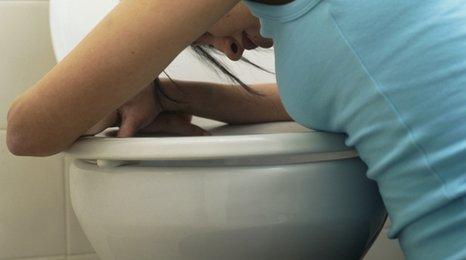Orthorexia: Worries about 'healthy eating' disorder
- Published
Most of us try to eat a healthy, balanced diet but one of the UK's biggest eating disorder groups says an increasing number of young people could be taking it to the extreme.
Orthorexia is an obsession with eating only healthy foods. The disorder isn't well known, but it can lead to other serious illnesses like anorexia and bulimia.
The National Centre for Eating Disorders (NCFED) says there's nothing healthy about it.
Sufferers often take their eating habits to dangerous levels, cutting out food groups and combining their strict diet with too much exercise.
'I want a good body'
Sam Monkhouse, who's 21 and from Portsmouth, says he's very conscious about the types of foods he eats.
"I follow a high protein diet and don't eat carbs," he said.
"Ninety per cent of the time, I only eat cottage cheese, natural yoghurt, eggs and chicken.
"I eat these foods because I want to have a good body."
Sam also has a regimented fitness regime.
"I work out twice a day, seven times a week," he said. "I work in a factory and at lunchtimes I do weights, sit-ups, and press-ups in one of the equipment rooms.
"When I get home I then go for a 45 minute run and do more toning and high-impact exercises.
"All in all, I probably spend more than two hours a day working out.
"If I eat a burger, which probably happens once in a blue moon, I have to burn it off straight away because I know it will turn into fat and I don't want fat on my body."
'Cousin of anorexia'
The National Centre for Eating Disorders (NCFED) receives more than 6,000 calls and emails a year from people suffering with orthorexia.
It's concerned that young people are most vulnerable and at risk of being duped into "fad" healthy eating diets, recommended in magazines and on the internet.
Deanne Jade is a psychologist and eating disorder specialist for the NCFED.
She said: "Orthorexia is a disorder not many people are familiar with and it's not just a wish to eat in a healthy way. It's really something that increasingly dominates your life."
"In my 30 years experience, I believe one in 10 women and around one in 20 men have orthorexia in the UK.
"Within this disorder, there are a lot of rules about food, such as eliminating carbs, meat or fat."
She says sufferers may also feel anxiety about eating out in case it means straying from their strict diet.
"You know it's serious when it affects your social life." she said.
"I call orthorexia the first cousin of anorexia. The people who show signs of orthorexia could go on to develop other illnesses and have serious health problems in the future."
- Published8 March 2011

- Published22 February 2010
